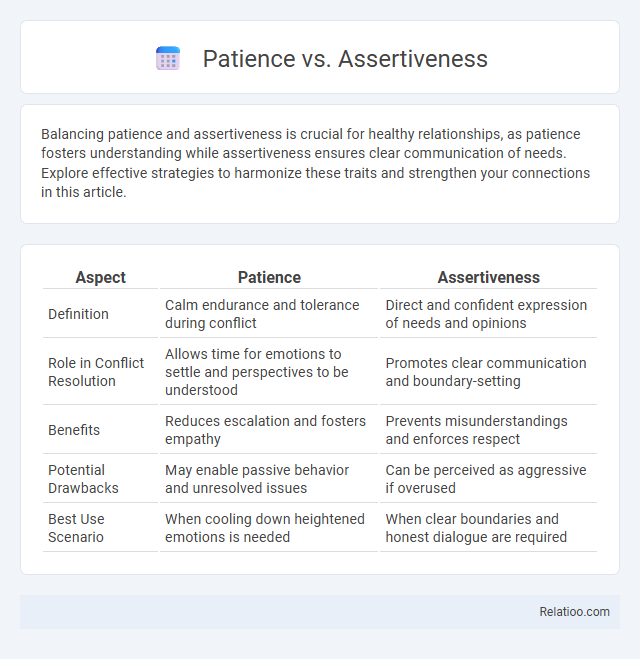Balancing patience and assertiveness is crucial for healthy relationships, as patience fosters understanding while assertiveness ensures clear communication of needs. Explore effective strategies to harmonize these traits and strengthen your connections in this article.
Table of Comparison
| Aspect | Patience | Assertiveness |
|---|---|---|
| Definition | Calm endurance and tolerance during conflict | Direct and confident expression of needs and opinions |
| Role in Conflict Resolution | Allows time for emotions to settle and perspectives to be understood | Promotes clear communication and boundary-setting |
| Benefits | Reduces escalation and fosters empathy | Prevents misunderstandings and enforces respect |
| Potential Drawbacks | May enable passive behavior and unresolved issues | Can be perceived as aggressive if overused |
| Best Use Scenario | When cooling down heightened emotions is needed | When clear boundaries and honest dialogue are required |
Understanding Patience and Assertiveness
Understanding patience involves recognizing the ability to remain calm and composed despite challenges, while assertiveness centers around confidently expressing your thoughts and needs without aggression. Balancing patience and assertiveness enables effective communication and conflict resolution, ensuring your voice is heard without sacrificing empathy. Cultivating both traits is essential for personal growth and fostering healthy relationships.
The Psychology Behind Patience
The psychology behind patience reveals it as a crucial emotional regulation skill, balancing impulses and enhancing long-term goal achievement. While assertiveness involves confidently expressing your needs and boundaries, patience requires endurance and tolerance without immediate reaction or frustration. Developing patience allows you to manage stress effectively, fostering resilience and emotional intelligence in challenging situations.
The Core Traits of Assertiveness
Assertiveness centers on expressing thoughts and feelings confidently while respecting others, a core trait that balances self-assurance with empathy. Unlike patience, which emphasizes tolerance and delayed response, assertiveness demands clear communication and boundary-setting to achieve goals effectively. Mastering assertiveness enhances interpersonal relationships by promoting honesty, directness, and mutual respect.
Benefits of Being Patient
Being patient enhances emotional resilience, reduces stress levels, and improves decision-making by allowing thoughtful reflection rather than impulsive reactions. It fosters stronger relationships through empathy and understanding, which can lead to greater collaboration and trust. Patience also promotes long-term goal achievement by sustaining persistence and adaptability in the face of challenges.
Advantages of Assertiveness in Daily Life
Assertiveness empowers you to express your thoughts and needs clearly while respecting others, fostering effective communication and reducing misunderstandings. This form of confident interaction enhances decision-making and conflict resolution, leading to stronger personal and professional relationships. Practicing assertiveness improves self-esteem and helps maintain boundaries, promoting mental well-being and balanced social dynamics.
Patience vs Assertiveness: Key Differences
Patience involves calmly enduring delays or challenges without frustration, while assertiveness emphasizes confidently expressing your needs and standing up for yourself. Balancing patience and assertiveness enhances communication by allowing you to wait calmly when necessary yet advocate effectively for your rights. Understanding when to practice patience versus assertiveness enables you to navigate social and professional situations with greater emotional intelligence and respect.
When to Choose Patience Over Assertiveness
Choosing patience over assertiveness is essential when situations require emotional restraint to avoid conflict escalation, such as during tense negotiations or interpersonal misunderstandings. Patience proves valuable in long-term projects, allowing time for careful analysis and relationship building, where premature assertiveness could disrupt progress. Recognizing moments that benefit from patience involves evaluating the potential impact on trust, collaboration, and stress levels, especially in professional or high-stakes environments.
When Assertiveness Outshines Patience
Assertiveness outshines patience in situations demanding immediate action or clear boundary-setting, such as workplace conflicts or urgent negotiations. While patience involves tolerance and delayed responses, assertiveness conveys confidence and fosters respect by articulating needs directly. Choosing assertiveness over patience can prevent misunderstandings, enhance communication efficiency, and promote proactive problem-solving.
Balancing Patience and Assertiveness for Success
Balancing patience and assertiveness is crucial for success, as patience allows you to remain calm and persistent during challenges, while assertiveness enables clear communication and confidence in pursuing your goals. Developing this balance helps you navigate conflicts effectively, maintain professional relationships, and make timely decisions without frustration. Your ability to blend these traits ensures resilience and proactive action in both personal and professional environments.
Cultivating Both Traits for Personal Growth
Cultivating both patience and assertiveness fosters balanced personal growth by enabling individuals to maintain calm resilience while effectively expressing their needs and boundaries. Patience enhances emotional regulation and long-term goal achievement, whereas assertiveness promotes confidence and clear communication, essential for healthy relationships and self-advocacy. Integrating these traits supports adaptability, reduces stress, and drives success across personal and professional contexts.

Infographic: Patience vs Assertiveness
 relatioo.com
relatioo.com